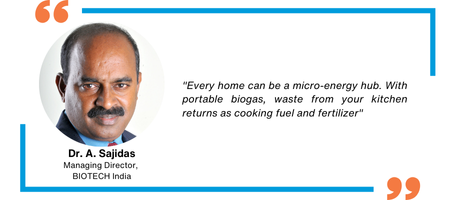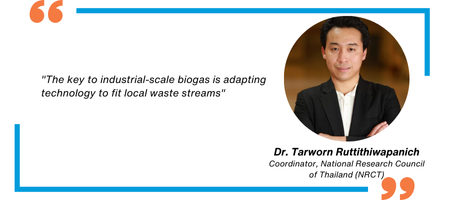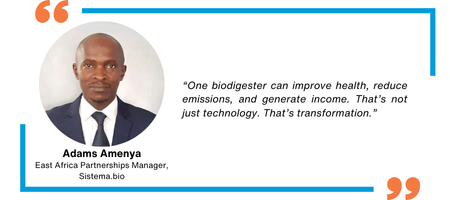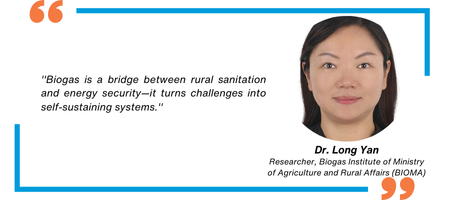Highlights from the Webinar: Innovations in Biogas Technology for Clean Cooking – Global Insights on Scalable Solutions
Biogas is a versatile and renewable energy source derived from locally available organic materials such as agricultural residues, animal manure, food waste, and sewage. As a clean cooking fuel, biogas presents a significant opportunity to reduce dependence on traditional biomass fuels like wood and charcoal, which are major contributors to indoor air pollution, deforestation, and greenhouse gas emissions.

Biogas systems, whether implemented at the household, community, or industrial level, can transform waste management practices while addressing energy poverty. They support sustainable development by promoting environmental health, enhancing food security through improved waste-to-resource systems, and reducing the burden on women and children who typically shoulder the responsibility of fuel collection and suffer most from the health impacts of smoke-filled kitchens.
Despite these benefits, widespread adoption of biogas for clean cooking faces technical, financial, and policy-related barriers. Community and household systems require localized solutions and behavioral change, while industrial-scale biogas needs significant investment and integration into national energy frameworks. This webinar brought together stakeholders from across the biogas value chain to explore pathways to scale and sustainability.
On May 21, 2025, leading voices in biogas innovation came together for a compelling webinar hosted by the Council on Ethanol Clean Cooking (CECC). With speakers from Asia, Africa and South America, the event highlighted practical breakthroughs and strategic insights into how biogas can power clean cooking, manage waste, and uplift communities around the world. The webinar was moderated by Mr. Jossy Thomas, Coordinator of the CECC.
The conversation spanned technologies ranging from household-scale digesters to industrial applications. While the contexts varied, one message was clear: biogas is more than just a clean fuel—it is a tool for environmental stewardship, economic empowerment, and public health.

Dr. Sajidas presented BIOTECH India’s pioneering work on fiberglass-based portable biogas systems. Designed for both rural and urban households, these digesters are lightweight, easy to install, and remarkably efficient. The systems allow families to transform organic waste into usable energy and organic fertilizer, reducing dependence on LPG and mitigating landfill pressure.
In contrast, Thailand’s focus was on scaling biogas solutions at the industrial level. Dr. Ruttithiwapanich of BIOTEC Thailand emphasized the importance of customizing systems to local agricultural and industrial contexts, such as cassava starch and rubber processing. Thailand’s bioenergy roadmap aims to increase renewable energy use to 30% by 2037, with biogas as a central pillar.


East Africa’s story was grounded in community impact. Representing Sistema.bio, Mr. Adams Amenya shared how biodigesters are changing the lives of smallholder farmers across Africa. Sistema.bio’s modular digesters not only provide clean cooking gas but also produce rich organic fertilizer, improving both nutrition and income at the household level. Their digital monitoring systems also track emissions reductions, tying local impact to global climate goals.
Long Yan from BIOMA, China brought in a systems-level perspective, showcasing large-scale biogas stations that provide fuel and fertilizer for entire communities. These projects integrate waste from livestock and toilets, offering a circular approach to rural development. Dr. Yan emphasized the role of policy, capacity-building, and South-South collaboration in scaling biogas solutions. From Samoa to Argentina, BIOMA has been exporting not just technology, but an ecosystem of training, standards, and partnerships.

The webinar concluded with a powerful reminder: clean cooking is no longer a peripheral issue. It sits at the intersection of climate, health, environment and development. Biogas, in its many forms, is uniquely positioned to address all three.
As momentum grows, the CECC and its partners continue to promote high-tier clean cooking solutions like ethanol, electricity, pellets, and of course, biogas. The challenge now is to scale what works, adapt it to new contexts, and ensure that no household or community is left behind in the clean energy transition.
Watch the full webinar recording here: Webinar Recording: Innovations in Biogas Technology for Clean Cooking


